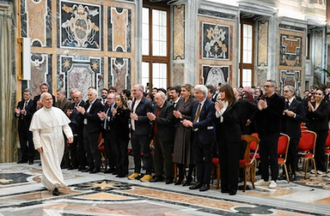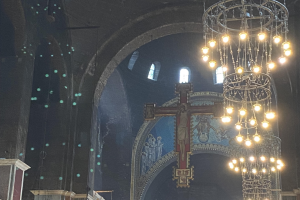Pope praises importance of cinema

Pope meets World of Cinema
Source: Vatican Media
The Vatican's Apostolic Palace was filled with actors, actresses, filmmakers, and script writers on Saturday morning as Pope Leo XIV met with members of the World of Cinema. Nearly 130 years after the first film premiered in Paris in 1895, the Pope highlighted the ongoing importance of film.
Moving from impressing audiences with visual effects, cinema became "an expression of the desire to contemplate and understand life, to recount its greatness and fragility and to portray the longing for infinity."
Pope Leo expressed his gratitude for what cinema represents: "a popular art in the noblest sense, intended for and accessible to all." More than just entertainment, films offer a narrative into people's spiritual journey.
This, he argued, is cinema's greatest contribution to humanity. It helps "audiences consider their own lives, look at the complexity of their experiences with new eyes and examine the world as if for the first time."
This introspection encourages people to rediscover part of the hope essential for a person to live life to the fullest.
Pope Leo affirmed that cinema is more than just moving pictures, because "it sets hope in motion."
Going into a cinema means crossing a threshold, the Pope noted. In the darkness of the theatre, our senses are heightened and our minds become more open to things we might have never imagined.
Productions reach people who are searching for entertainment but are also seeking meaning, beauty, and justice. In a world where screens are ever-present in our day-to-day lives, cinema can be a screen that offers more.
Pope Leo stressed "it is an intersection of desires, memories and questions." Our minds are educated and our imagination grows.
Theatre and cinemas, the Pope pointed out, are "the beating hearts of our communities because they contribute to making them more human."
However, these places of cultural importance are facing decline. He highlighted how "art of cinema and the cinematic experience" are in danger.
The Pope encouraged these institutions to not give up, but continue to work to cooperate to preserve the cultural and social value.
Art opens us up to what is possible, he said. Beauty is not an escape from reality, but a call.
"When cinema is authentic, it does not merely console, but challenges," explained the Pope. Cinema helps us reflect on the questions deep within our hearts.
In the Jubilee Year, we are invited to move towards hope and the presence of so many artists from around the world is an example of this hope.
The Pope noted how all those present are also pilgrims of hope. However, their journey is "not measured in kilometers but in images, words, emotions, shared memories and collective desires."
Reflecting on the Church's appreciation for the work of actors, directors, writers, and filmmakers, Pope Leo expressed his desire to renew the friendship between the Church and cinema.
"Cinema is a workshop of hope, a place where people can once again find themselves and their purpose," he argued, calling on everyone present to make cinema an art of the Spirit.
The cinema can be a witness of hope, beauty, and truth-of which the present world is in desperate need. Pope Leo called on all those involved in cinema to uphold cinema's call to bear witness to hope, beauty, and truth.
He challenged them not to be afraid to confront the problems of the world today. "Good cinema does not exploit pain; it recognizes and explores it," said the Pope, adding that this is what "all the great directors have done."
Giving voice to the complex and sometimes dark feelings that we find in our hearts is "an act of love," noted the Pope.
Concluding, Pope Leo XIV pointed out that filmmaking is a communal effort and it requires working together with all types of professionals-from directors and prop masters to electricians and makeup artists.
Everyone, he said, is important to create the final product, since their mixture of gifts and talents help all involved "make their unique charisma shine in a collaborative and fraternal atmosphere."
At the end of the audience, each of the artists had the chance to greet Pope Leo.
American actress Cate Blanchett gave the Pope a bracelet and American filmmaker Spike Lee presented him with a personalized basketball jersey of the New York Knicks.
Last week, another Hollywood star visited Pope Leo.
Robert De Niro was received by Pope Leo XIV in the Sala del Tronetto of the Apostolic Palace, amidst the Pontiff's busy schedule.
The famous two-time Oscar-winning 82-year-old actor is American but proud of his Italian ancestry. He had wanted to conclude his 48-hour visit to Rome with a handshake from the Pope, his fellow countryman.
The Holy Father has always enjoyed going to the movies. De Niro was accompanied by five photo people who posed for a photo with the Pope after he presented each of them with a rosary.
De Niro's visit to the Vatican offered an immersion in the artistic beauty of the Apostolic Palace - the perfect finale after yesterday's experience, when, standing on the balcony with Mayor Roberto Gualtieri at the Campidoglio, he was captivated by the splendor of the Imperial Forums.
"Rome is more than a city; it's a living work of art," said the star to the mayor, who presented him with the Lupa Capitolina, the city's highest honour. The protagonist of legendary films - including The Mission and The Godfather, for which he even learned the Sicilian accent - accepted the award with emotion: "To be recognised here, in a place that has given so much to the world of culture, cinema, and beauty, is truly moving…"
The actor added: "My family has roots in Italy, so this recognition holds a very special meaning for me."


















